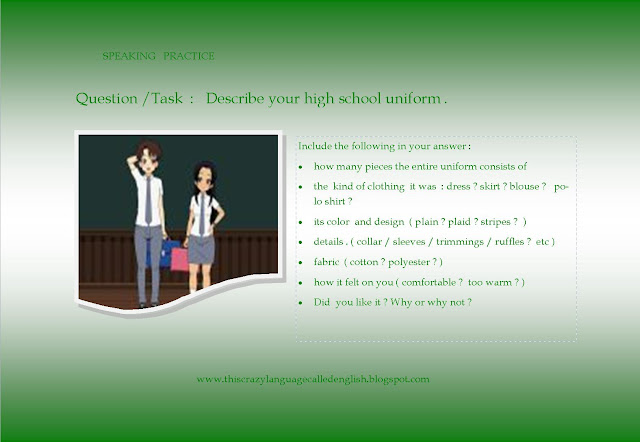COLLECTIVE NOUNS
A collective noun takes a singular verb
when it is referred to as a unit or as a
group acting as one . However , it takes
a plural verb when its members are referred to as separate individuals with
separate actions or qualities . Examples of collective nouns are committee , board , council , group ,
team , batch , congregation and entourage.
Examples :
- The
senate committee on ethics has
decided to investigate the complaint against the solon. [ singular ]
- The
senate committee on ethics have
been arguing since this morning.[plural]
Activity : Encircle the letter of the
answer that will correctly complete each sentence.
1.
The choir ________still deliberating on the
repertoire of songs for the jubilee
concert.
a. is b. are c. has d. have
2.
The congress ______________ divided on the issue of
charter change .
a.
seems b. seeming c. seem d. has seemed
3.
The FBI ____________
its investigation on the fraud case.
a.
have wrapped up b. wrapping up
c.
has wrapped up d. are
wrapping up
4.
The parliament _________________
to have a recess for a month.
a.
are scheduled
b. is scheduled
c.
were scheduled d. scheduled
5.
The senate ___________ going to start the session
when some of its members walked out of the hall.
a. are b. were c. was
d. will
6.
Due to the sudden rain ,
the marching band _____________ to different directions .
a.
going b. has gone
c. have gone d. gone
7.
HS Batch ’98 _____________going
to have a reunion at the Atlanta Polo Club a week from now.
a.
is b.
are c. was d.
were
8.
The band
______________ October 27 as
the date of their fund-raising concert .
a. have chosen b. chosen c. choose d. has chosen
9.
FC Barcelona
______________ on a one-month vacation
after winning the Copa Cup .
a.
is b. are c. are
going d. have gone
10.
The board of
directors _________________ a split decision on the election of a new chairman
.
a.
has rendered
b. have rendered
b.
is rendering
d. has rendering
























